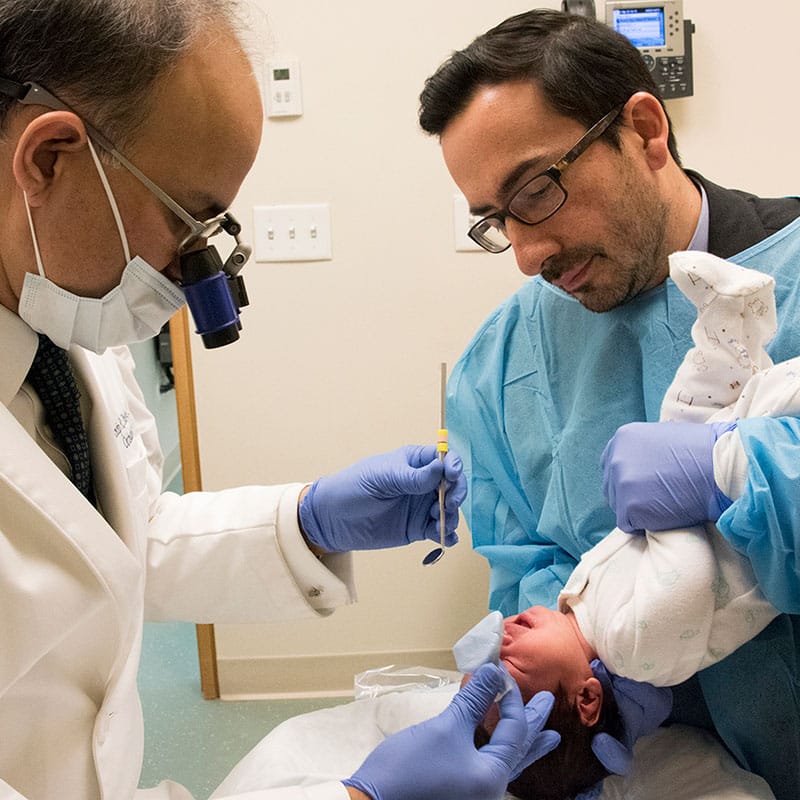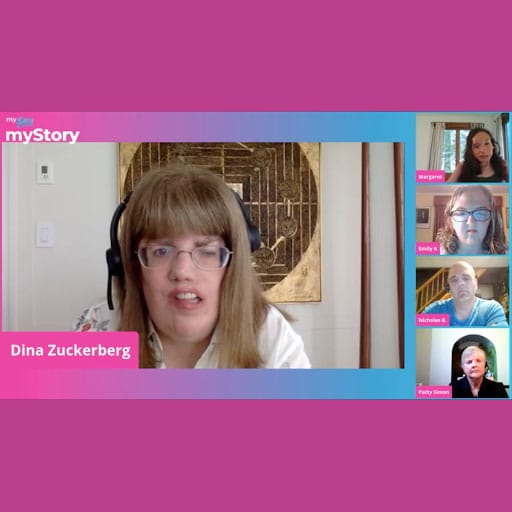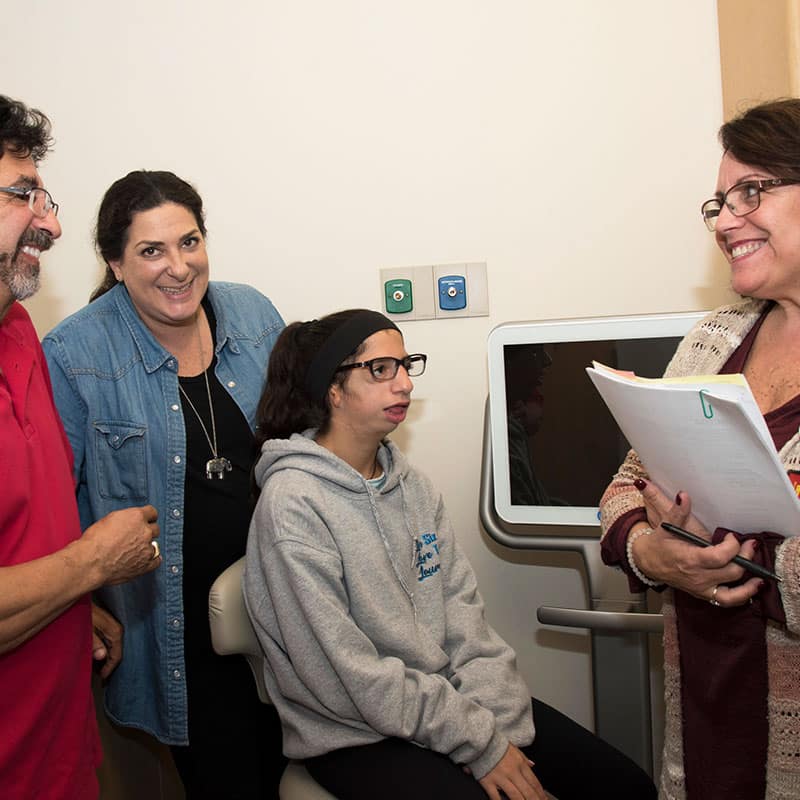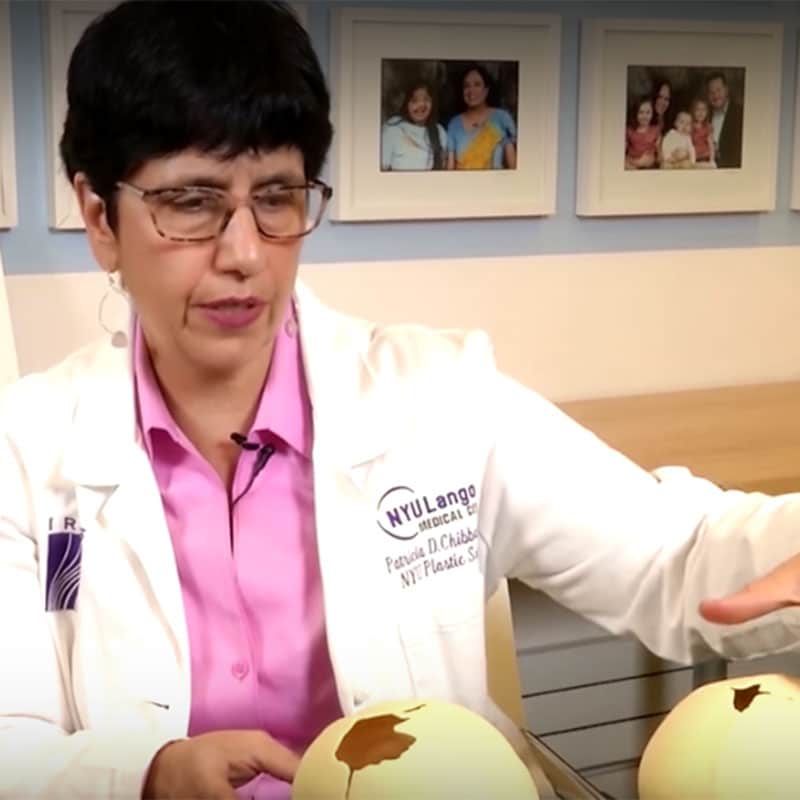Genetics
To download these guides in PDF form, click below:
A Guide to Genetics & Genetic Evaluations for Parents of Children with Craniofacial Conditions
In This Article
Click to jump to your selected section.
The Genetics of Facial Differences
Get an overview of the relationship between genetics and craniofacial differences.
Genetics Evaluations
Learn all about these evaluations for your child.
Pregnancy and Facial Differences
Learn about tests that can be performed during a pregnancy to check for facial differences.
Advice for Parents
Some general tips for parents considering a genetic evaluation for their child.
When a child is born with a facial difference, as parents, you will have many questions and concerns. You may ask why your child was born with a facial difference. You may be concerned that your child’s condition will affect his or her development. You may want to know if you have an increased chance of having another child with the same facial difference.
You can learn the answers to some of these questions by having your child medically evaluated by genetic specialists. A genetics evaluation is an important part of the care of a child with a facial difference because it will help you better understand the cause of your child’s condition and help you learn more about the condition itself.
The Genetics of Facial Differences
Are all facial differences genetic?
No, not all facial differences are genetic. While it is recommended that children with facial differences have a genetics evaluation, having this evaluation does not necessarily mean that your child’s condition is genetic. Nevertheless, having a genetics evaluation may help you gain a better understanding of your child’s condition.
How are facial differences inherited?
Facial differences may be inherited in several different ways. Many facial differences are dominantly inherited traits. A dominantly inherited condition requires the presence of one non-working gene of a pair. An individual with a dominantly inherited condition has a 50 percent chance of passing on the non-working gene to his or her child and a 50 percent chance of not passing it on. Sometimes you see that the condition is “coming down” through one side of the family. Some examples of dominantly inherited conditions are Crouzon syndrome, Pfeiffer syndrome, and Treacher Collins syndrome.
Some conditions, like cleft lip and/or palate, may be caused by a combination of both genetic and non- genetic factors. We call this multifactorial inheritance. When a child has a condition caused by multifactorial inheritance, the chance that the parents will have another child with the same condition is relatively low. A child with a cleft lip, with or without a cleft palate, frequently does not have any other family members with a cleft. Your medical geneticist and your genetic counselor will help you to understand the cause of your child’s condition.
If my condition or that of my child is dominantly inherited, why is it that no one else in the family has a facial difference?
Dominantly inherited conditions may have certain characteristics that explain why there is no one in the family with the same condition. Sometimes the mutation occurs as the result of a new change in a gene that is either in the egg or the sperm, and no one else in the family has a facial difference. Sometimes the condition may be so mild in members of the family that no one is aware that they have a facial difference. Lastly, sometimes a person who has the mutation may have no visible signs of the condition, but he or she still carries the gene change and can pass it on.
Remember, not all facial differences are genetic. If your child’s condition is not genetic, it may explain why no one else in the family is affected.
If the change in the gene causing this condition happened for the first time, is it my fault?
No, new changes or mutations take place in a gene by chance and no one is to blame. Research is being performed to explore various possible causes for gene mutations. However, we do not know the causes of the gene mutations that are related to facial differences.
Genetics Evaluations for Craniofacial Conditions
What is a genetics evaluation?
A genetics evaluation is a meeting with medical specialists who have special training in the care of individuals born with health conditions that may possibly be caused by a change in one or more genes. These medical specialists include medical geneticists, who are physicians, and genetic counselors, who are non- physician professionals. A typical genetics evaluation involves:
- Helping you to understand what genetic testing is and the benefits of genetic testing for you and your child.
- Asking you questions about your child’s medical and developmental history.
- Asking you questions about your family’s medical history.
- Asking questions about your pregnancy. The health care team does not ask these questions because they think you did anything to cause your child’s facial difference, but because sometimes details about a pregnancy can provide information about a child’s condition.
- Performing a physical examination of your child and possibly other family members.
- Ordering or reviewing tests (e.g., blood tests, X-rays, CT scans, MRIs) that may help to determine the cause of your child’s condition. Not every child will have the same tests. Sometimes the physician and/or genetic counselor will identify the condition immediately and at other times they will need the test results in order to make a diagnosis. The genetic specialists will explain each test to you.
- Diagnosing your child’s condition.
- Referring you to other specialists for additional testing, evaluations, or on-going care.
- Providing you with information about tests that you may have before or during a future pregnancy to determine whether the fetus is affected.
- Providing you with an opportunity to talk about your experience of having a child with a facial difference. The genetic specialists, especially the genetic counselor, can provide you with support during a difficult period and remain a link to new information and care.
- Writing a letter to you that explains the results of the genetics evaluation.
- Providing you with copies of the reports and test results so that your child’s medical records will be complete.
What are the benefits of knowing your child’s diagnosis?
- Understanding whether there may be other problems associated with your child’s facial difference.
- Determining the best medical care for your child.
- Learning what to expect in the future, such as how your child may develop.
- Identifying other family members who may have the same condition.
- Understanding the chances that you, your child with a facial difference, and/or other family members have of having another child with the same condition.
- Helping answer your questions about why your child was born with a facial difference.
When should parents seek a genetics evaluation?
A genetics evaluation should be performed as soon as possible after the birth of a child with a facial difference. An early evaluation can help to prevent misunderstandings and may reduce the worry associated with “not knowing” about your child’s condition. However, it is never too late to have a genetics evaluation.
What is the possible timeline for a genetics evaluation?
- A genetic specialist may speak with you by telephone before your appointment to ask about your family history and your child’s medical history and to help you identify and obtain the medical records that will be important for your appointment.
- The total number of appointments will vary, but often ranges from one to several. At your first appointment, the genetic counselor will try to give you a sense of how many sessions will be needed.
- The genetics team may follow you and your child for several years and will be available to answer questions in the future.
- The manner in which the genetics evaluation is performed may vary slightly from center to center.
Will a genetics evaluation always be able to determine the cause of a child’s facial difference?
Even after a careful genetics evaluation, genetic specialists may not be able to determine the cause of a child’s facial difference, give a definitive diagnosis, or tell the chance of having another child with the same condition. However, this doesn’t mean that the specialists won’t be able to provide you with new information later – there are frequent advances in the field of genetics. If your child’s initial genetics evaluation is not conclusive, it is recommended that you follow up with your genetic specialist to inquire about new developments at time intervals recommended by your genetics professional.
How can I schedule a genetics evaluation?
Ask your child’s pediatrician or a member of your child’s craniofacial team to refer you to a board-certified medical geneticist or genetic counselor. If you are unable to find a board-certified medical geneticist or genetic counselor in your area, you may contact the following organizations for assistance:
GENETIC COUNSELING
American Board of Genetic Counseling (ABGC)
Office Address
18000 West 105th Street Olathe, KS 66061
Mailing Address
P.O. Box 14216 Lenexa, KS 66265
(913) 895-4617 | www.abgc.net
National Society of Genetic Counselors
401 N. Michigan Avenue Chicago, IL 60611
(312) 321-6834 | www.nsgc.org
MEDICAL GENETICS
American Board of Medical Genetics
9650 Rockville Pike Bethesda, MD 20814-3998
(301) 634-7316 | http://abmgg.org/
American College of Medical Genetics
9650 Rockville Pike Bethesda, MD 20814-3998
(301) 634-7127 | https://www.acmg.net/
Genetic Terms and Concepts to Know
What are genes?
Genes are a blueprint or code for everything that takes place in the body. A child is a little like the mother and a little like the father. This is because both the egg and the sperm have information that determines how the baby will develop. That information is contained in small units called genes.
Everyone has thousands of genes, which occur in pairs (two at a time). A child receives one gene of each pair from the mother in the egg and one gene of each pair from the father in the sperm. Sometimes there is a change in the code of the gene that causes the gene not to work as it should. This change is called a mutation.
What is a mutation?
A mutation is a permanent change in the code of a gene that causes the gene not to work the way it should. Changes may consist of a small missing piece of the gene, an extra piece of the gene, or a single change in the code of the gene. Sometimes a single non-working gene causes a problem and sometimes it takes two or more non-working genes to cause a problem.
What is a genetic condition?
A genetic condition is caused by the presence of one or more genes that has a mutation and is non-working. Sometimes a mutation that causes a genetic condition comes down through one side of the family. There may be other people on this side of the family who have the same condition. Sometimes the mutation happens for the first time in the egg or the sperm from which the baby develops and there are no other family members with the same condition.
Having a Child with a Facial Difference, and Choices for Future Pregnancies
Is it possible to find out during a pregnancy whether the baby will have a facial difference?
Some families have this choice. If you have learned the exact mutation that is causing your child’s facial difference, you may have an accurate test performed during your pregnancy to find out whether the fetus has the same mutation as your child with a facial difference. Please note: even if you know that the fetus has the same mutation as your child with a facial difference, doctors cannot always predict whether the fetus will be more or less severely affected.
What tests may be performed during pregnancy?
- Ultrasounds, also called sonograms (pictures of the fetus taken during the pregnancy), can sometimes help to make a diagnosis of a facial difference during pregnancy. Periodic ultrasounds are a routine part of prenatal care for most pregnant women. An ultrasound is a safe procedure.
- Chorionic villus sampling (CVS) is a procedure that can be performed between 10 and 13 weeks of pregnancy. CVS consists of performing diagnostic testing on a small sample of the developing placenta. The developing placenta contains cells that are of the same origin as the fetus. These cells can be examined to determine whether or not they contain genetic abnormalities that may result in a facial difference in the fetus. CVS is a safe procedure with a small chance of complications.
- Amniocentesis is a procedure that can be performed between 15 and 18 weeks of pregnancy, sometimes later. Amniocentesis consists of examining a small amount of amniotic fluid which contains cells from the fetus. The fluid can be analyzed to determine whether there is an abnormality in the chromosomes or in a specific gene. Amniocentesis is a safe procedure with a small chance of complications.
CVS or amniocentesis is usually recommended as an option for women who have a previous child with a genetic disorder, a family history of a genetic disorder, or certain findings on an ultrasound or blood test. Like other medical tests, women should check with their health insurance provider to see if the tests are covered and if preauthorization is required. Please note: no diagnostic test is correct 100% of the time.
Are there tests that can be performed before pregnancy?
Yes. There is a test called pre-implantation genetic diagnosis (PGD). During PGD, embryos that have been formed outside of the body using in vitro fertilization (IVF). The embryos can be tested by a special method (PGD) – to find out whether they have a gene mutation that might lead to a facial difference. Only the embryos without the mutation would be transferred to the mother. Please note: though this test significantly reduces the chance that the fetus will have a facial difference, it is still possible for an error to occur.
How can I obtain more information about these tests?
A genetic counselor or medical geneticist can provide you with more details about these tests, including how they may help you, how they are performed, and their safety and accuracy.
Is the doctor or genetic specialist going to advise me/us whether or not to have another baby?
It is not the role of a genetic specialist to tell you whether to have another pregnancy. A responsible geneticist and genetic counselor will be respectful of your views and feelings, your philosophy of life, as well as your religious and moral values. Genetic specialists see their role as helping you to understand your situation and choices, and supporting whatever decisions you make about childbearing.
How do we talk to children with facial differences about having children of their own?
When your child is born with a facial difference, there are so many things to think about that you may not think about this question. As your child gets older, talking to them about having children of their own may become more important. It is difficult to give one answer to this question because there are so many variables. Some children with a facial difference have parents who do not have a facial difference and some have parents with the same facial difference. Some children will have less than a 5 percent chance of having a child with a similar condition and some may have as high as a 50 percent chance. As a parent, you may have different feelings about your child having children than your child does. It is not uncommon for parents to differ with their child about childbearing.
Bring up the topic with your child; you do not need to wait for your child to ask you. Handling this topic is a little like talking to a child about sex. You have to discuss it, but you do not have to say everything all at once. A child with a facial difference is in most ways like any other child. Girls who are ten years of age or a little older may already be thinking about having children of their own. Boys usually do not think about having children until they are older.
Advice for Parents
- Give your child accurate information about the chances of having a child of his or her own with a facial difference versus without a facial difference.
- Support your child in making his or her own decisions about childbearing.
- Go with your child to see a genetic counselor or encourage your child to see a genetic counselor so that he or she really understands the issues and the possibility of having a child with or without a similar facial difference. Children’s perspectives vary and may depend on their age, sex, view of the severity of their own condition, and their experience with their care and caregivers.
- Your experience in having a child with a facial difference may not be the same as your child anticipates his or her experience will be.
- You can always ask the advice of a genetic counselor about how to talk with your child about these issues.
- Finally, try not to tell your child what you think his or her reproductive choices should be. Ultimately, it will not be your decision to make, but that of your adult child.
Transforming Lives: The Impact of Prenatal Diagnostics on Postnatal Care
myFace created a webinar in which Dr. Thomas A Imahiyerobo provides valuable insight on the importance of prenatal counseling when an expectant parent learns that their child will be born with a craniofacial condition.
In This Article
Click to jump to your selected section.
The Genetics of Facial Differences
Get an overview of the relationship between genetics and craniofacial differences.
Genetics Evaluations
Learn all about these evaluations for your child.
Pregnancy and Facial Differences
Learn about tests that can be performed during a pregnancy to check for facial differences.
Advice for Parents
Some general tips for parents considering a genetic evaluation for their child.







